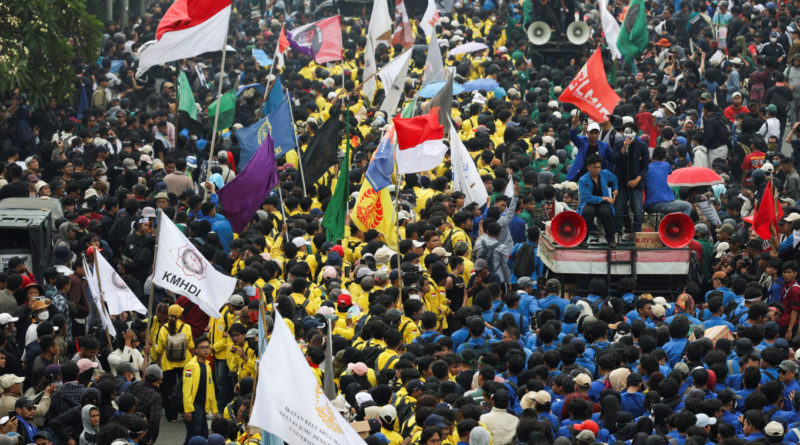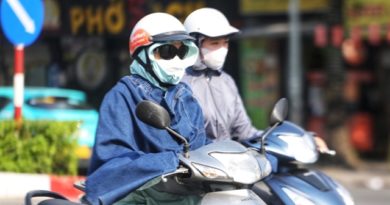ASEANEWS HEADLINE | INDONESIA: Protests in multiple cities as House delays change to election law
University students take part in a protest outside the House of Representatives compound against the revisions to the country’s election law, which analysts believe goes through a rushed process of legislation and is designed to block a popular candidate from running as the capital’s governor in Jakarta, August 22, 2024. (Reuters/Ajeng Dinar Ulfiana)
.
The plenary session to pass the changes was delayed due to a lack of a quorum, legislator Habiburokhman told reporters outside the parliament building.
.
.

T he House of Representatives postponed ratifying changes to an elections law on Thursday amid protests in multiple cities, following outcry over legislation seen to strengthen the political influence of outgoing President Joko “Jokowi” Widodo. The plenary session to pass the changes was delayed due to a lack of a quorum, legislator Habiburokhman told reporters outside the parliament building. It is unclear if the House will reconvene to pass the law before the registration for regional elections opens next Tuesday. The House planned to ratify changes that would have reversed a ruling by the constitutional court earlier this week. The legislative changes would have blocked a vocal government critic in the race for the influential post of Jakarta governor, and also paved the way for Jokowi’s youngest son to run in elections in Java this November. The power struggle between the parliament and the judiciary comes amid a week of dramatic political developments in the world’s third-largest democracy, and in the final stretchof the president’s second term. Jokowi downplayed, saying on Wednesday the court ruling and legislative deliberations were part of standard “checks and balances”.
.
The home affairs minister said the changes were intended to provide legal certainty. More than 1,000 demonstrators gathered on Thursday outside the House building in Jakarta and across multiple cities in Java, some holding banners accusing Jokowi of destroying democracy. Authorities fired tear gas at demonstrators in Semarang, according to footage from Kompas TV. “This is the peak of my disdain,” said Afif Sidik, a 29-year-old teacher who joined the protest outside parliament. “This is a republic. It’s a democracy, but if its leadership is decided by one person, or an oligarch, we can’t accept that.” Legal experts and political analysts have described the power struggle as bordering on a constitutional crisis. Elections analyst Titi Anggraini characterised the manoeuvre as “constitutional insubordination”. The street protests follow a wave of criticism online, with blue posters featuring the words “Emergency Warning” above Indonesia’s national eagle proliferating on social media. The rupiah and Jakarta’s main stock index slumped by midday Thursday, hit by concerns of protests as well as the country’s widening current account deficit. The Constitutional Court on Tuesday revoked a minimum threshold requirement to nominate candidates in regional elections and kept the minimum age limit of 30 years for candidates. That ruling effectively blocks the candidacy of the president’s 29-year-old son from contesting the race for deputy governor in Central Java, and would allow Anies Baswedan, the current favourite, to run in Jakarta. But within 24 hours the parliament had tabled an emergency revision to annul the changes. All parties except one, the Democratic Party of Struggle (PDI-P), have agreed to the revision of the law. “Indonesian democracy is once again at a crucial crossroads,” Anies posted on social media platform X, urging legislators to remember its fate rested in their hands. The House is now dominated by a big-tent coalition aligned to the outgoing president, popularly known as Jokowi, and president-elect Prabowo Subianto. Prabowo, who won a landslide victory in February’s elections, will be inaugurated on Oct. 20, with Jokowi’s eldest son, Gibran Rakabuming Raka, as his vice president. Jokowi is facing mounting criticism for the increasingly bold ways his government is consolidating power, and over the creation of his own political dynasty. “The ruling of the constitutional court is final and binding,” said Bivitri Susanti, from the Jentera School of Law, “It is not possible for the legislative body to violate the judiciary’s ruling. This is a power struggle.” First elected in 2014, Jokowi was at the time hailed as a democratic hero, in large part because he was seen as untethered from the country’s entrenched oligarchy and military elite. Jokowi last week hailed his government’s record on the economy, development and infrastructure building in his final state of the nation address. The former Jakarta governor has served the maximum two terms for a decade in power after beating Prabowo twice, in 2014 and 2019 elections.
Agencies Jakarta
Thu, August 22, 2024
.

@[email protected]
Click to read: https://www.thejakartapost.com/indonesia/2024/08/22/protests-in-multiple-cities-as-house-delays-change-to-election-law.html.


 Memento Maxima Digital Marketing
Memento Maxima Digital Marketing






